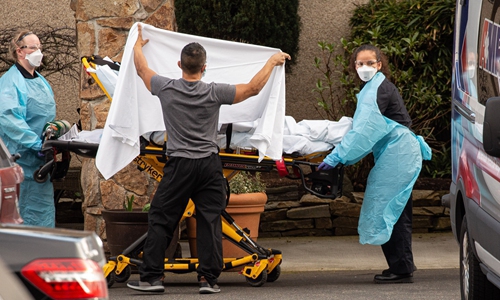HOME >> SOURCE
Barriers should be removed to send medical supplies to US
Source:Global Times Published: 2020/3/24 23:23:40

Healthcare workers transport a patient on a stretcher into an ambulance at Life Care Center of Kirkland in Kirkland, Washington. Photo: AFP
As the number of US coronavirus cases surges, hospitals and clinics are fast running out of medical supplies like masks, gloves, gowns and goggles which are crucial to the battle against the virus.China, with its ramped-up production capacity, may be the only country that has the ability to meet US demand at this juncture.
There is no export ban on medical equipment in China as its national mobilization amid the coronavirus outbreak has seen medical supplies swell significantly, allowing local enterprises to export shipments while ensuring that domestic demand is met. China now needs to help the rest of the world fight the virus, otherwise it will face the risk of a second wave of imported infections.
The key to the global battle against the pandemic now hinges on whether the US government can put aside its bias and prioritize people's lives and health, and contain the coronavirus. It is true that the Trump administration recently removed tariffs on some medical goods imported from China, but that's not enough to address shortages of much-needed medical supplies.
Despite all clashes, it is essential for the two sides to strengthen cooperation to remove barriers on the supply of medical goods.
For starters, the US should lift all tariffs it has imposed over past years on Chinese exports of medical equipment needed to combat the outbreak.
Second, the US should speed up the verification and certification process for relevant Chinese exporters.
Third, the US government and relevant departments like the Centers for Disease Control and Prevention need to submit a list of urgently needed items to China as soon as possible, so that the Chinese side can see if it can help and coordinate enterprises to speed up production based on its domestic situation.
Fourth, as airlines worldwide reduce international flights in the wake of the pandemic, coordination efforts are needed from both sides to smooth logistics so as to deliver relevant goods to their destinations as quickly as possible.
Fifth, imports of essential medical supplies from China should not be seen as contributing to the US-China trade deficit, nor as an excuse for the US to impose new tariffs in the future. The two sides need to have a common understanding that their trade frictions should be put aside so that the virus can be contained.
Sixth, trade departments on both sides should establish coordination groups led by high-level officials. Sourcing medical supplies in a time of emergency is complicated and requires cooperation from all sides. Let's hope that this time the White House will see Americans' lives and health as their top concern.
Posted in: GT VOICE